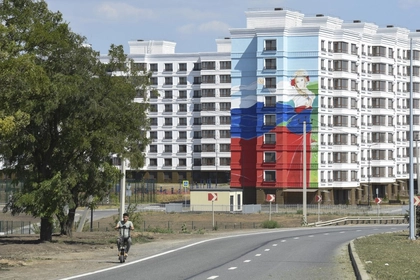“Specialists from the Murmansk Vodokanal completed the installation of a water tower in the village of Kolarovka,” reads a message posted on a pro-Kremlin Telegram channel.
The report of a link between a city in arctic Russia and a village in Zaporizhzhia Oblast, 3,000km (1,850 miles) to its south, is typical of a program to persuade Russians to connect with Ukrainian districts attacked and destroyed by their invading forces.
JOIN US ON TELEGRAM
Follow our coverage of the war on the @Kyivpost_official.
It was a tactic first seen after the illegal annexation of Crimea in 2014. Then the governors of Russia’s regions were ordered to help 14 districts and one city on the peninsula with practical and financial aid.
In May 2022, three months after the full-scale invasion, Russia created “a headquarters for the restoration of liberated Ukrainian territories,” and at least 27 regions of the Russian Federation signed up for the program, according to research by the Important Stories media outlet.
Because the assistance is provided from regional budgets, the local Russian authorities generally do not give money directly, but deliver humanitarian aid, provide transport and construction equipment, or send people to work on roads, schools, and kindergartens.
The Chuvash Republic delivered construction materials to the occupied Berdiansk region, for example, while roofing equipment for the restoration of houses was delivered to Tokmak, Zaporizhzhia Oblast, from the Penza region.

Moscow Prime Suspect for Sabotage Aimed at Disrupting Olympic Games
In the majority of cases, it’s not the aid that is most important, but the propaganda effect of being seen to provide it. Most messages underline that something was done within Russia or as an “all-Russian project” to make the point that occupied Ukraine is part of the motherland.
“The Kremlin now has to make extra efforts to ensure people get the feeling that the annexation of these regions is something good, correct, and necessary,” said Ivan Fomin, Democracy Fellow at CEPA. “They have to look for ways to symbolically demonstrate that these occupied regions are truly part of the Russian space, so the Ukrainian regions will be perceived as something less alien.”
Such sponsorship programs are also geared towards winning over Ukrainians. The Kremlin wants to make people in the occupied territories feel part of Russia and believes this is more likely if they are tied to a specific Russian region.
The russification of children is a key component. They are sent to the Russian regions for summer camps and invited to participate in cultural projects. For example, around 500 children from the occupied part of Zaporizhzhia Oblast spent the summer in Dagestan, their twinned region. Young people are also offered tours to Russia, and visits to museums, theaters, and sights in Russian cities.
These activities are aimed at creating new social ties between Ukrainian and Russian children, but they are not just vacations, it’s brainwashing,” said Yurii Sobolevsky, First Deputy Head of Ukraine’s Kherson Oblast Council. “They force them to listen to the Russian national anthem and constantly offer lessons in patriotism. It’s all aimed at zombifying them.”
Building links between regions in Russia and Ukraine has another practical goal. When local residents in the occupied territories refuse to collaborate with the colonial authorities, they are able to import specialists from their linked Russian cities.
The Russian Supreme Court announced that courts would start work in the occupied Ukrainian territories on September 21 and appointed 107 judges, many from Russia, for the self-proclaimed Donetsk People’s Republic.
Judges from Perm, and other regions of Russia, were also appointed to Prymorskyi and Zhovtnevyi district courts in Mariupol, according to Dmytro Zabavyn, a Ukrainian Deputy on the exiled Mariupol City Council.
As often happens in Russia, there is a difference between the image and reality. Most Russian regions that have pledged to restore cities in the Ukrainian-occupied territories have severe housing and community problems of their own and can ill-afford to help others.
For example, Ingushetia, where 30% of the population lives below the poverty line, will replace a water pipeline in the city of Molochansk, in its twinned district of Tokmak.
“Ingushetia has serious problems with water supply, and throughout the summer of this year, the Malgobek district, some villages of the Nazranovsky district, and the city of Karabulak remained without water due to worn-out pipes,” said Zarina Sautieva, a Democracy Fellow at CEPA originally from Ingushetia. “The news that Ingushetia will allocate money to repair pipes in the occupied territories of Ukraine causes bewilderment and anger among the population, who themselves live in terrible conditions.”
There are two key motivations for the adoption program, Sautieva said. First, the federal budget can’t handle all the expenses of the ongoing war, and it is a way for Moscow to force impoverished regions to allocate money from their budgets for the occupied territories.
Scondly, it gives the Kremlin a way of roping the heads of regions into the restoration story so they also bear responsibility for the war, which will help maintain their loyalty to Vladimir Putin’s regime.
The Ukrainian authorities are skeptical about the program but understand the needs of people in the occupied territories and recognize that most keep their distance from the propaganda that comes with the assistance.
“If someone has a need and can’t survive in any other way, then of course people should accept this aid,” Sobolevsky said.
Elina Beketova is a Democracy Fellow at the Center for European Policy Analysis (CEPA), focusing on the temporarily occupied territories of Ukraine. She worked as a journalist, editor, and TV anchor for various news stations in Kharkiv and Kyiv, and currently contributes to the translator’s team of Ukrainska Pravda.
Reprinted From CEPA. See the original here.
The views expressed are the author’s and not necessarily of Kyiv Post.
You can also highlight the text and press Ctrl + Enter






